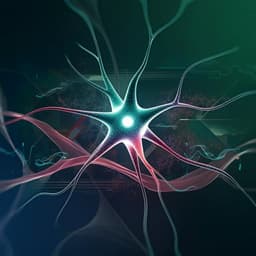
Medicine and Health
Feed your microbes to deal with stress: a psychobiotic diet impacts microbial stability and perceived stress in a healthy adult population
K. Berding, T. F. S. Bastianssen, et al.
The study investigates whether a whole-diet, microbiota-targeted “psychobiotic” intervention can beneficially affect mental well-being, specifically perceived stress, in healthy adults. Prior work shows the gut microbiota influences brain processes, mood, and cognition. While probiotics and prebiotics show psychobiotic effects, and habitual dietary patterns correlate with mental health, it is unclear if comprehensive dietary patterns can exert psychobiotic effects in humans. The authors aim to test if a diet high in prebiotic fibers and fermented foods can alter gut microbiota composition/function and reduce stress, exploring gut-brain axis mechanisms (e.g., immune signaling, HPA axis, tryptophan metabolism).
Emerging evidence links diet to the microbiota and mental health, with observational studies associating healthy dietary patterns (e.g., Mediterranean diet) with reduced risk of mental illness and trials suggesting dietary improvements can reduce depressive symptoms. Single-food interventions (e.g., fermented foods) can modulate microbiome-host interactions but may miss synergistic effects of whole-diet patterns. Few clinical trials have tested microbiota-targeted dietary interventions on mental health/cognition. Examples include: an 8-week nutrition education program in obese women increasing fiber, vegetables, and dairy shifted microbiota (e.g., increased Bifidobacterium bifidum) and decreased depression; in older adults, 12-month high adherence to a Mediterranean diet improved cognition correlated with responsive microbial species. Preclinical data implicate immune modulation, HPA axis, and tryptophan metabolism in diet–brain links, but human trials often do not measure microbiota changes, underscoring the need for whole-diet interventions assessing microbiota and mental health outcomes.
Design: Single-blind, randomized, controlled trial in healthy adults aged 18–59 years recruited in Cork (2018–2019). Participants were randomized to a psychobiotic diet (DIET; n = 24) or control diet guidance (CONT; n = 21). Intervention duration reported as 4 weeks in the abstract; assessments at baseline and post-intervention. Inclusion/Exclusion: Healthy adults; excluded if significant illness, medication use (except contraceptive pill), peri-/post-menopausal, or seeking help for physical/mental illness. Interventions:
- Psychobiotic diet emphasized foods known to influence the microbiota: whole grains (5–8 servings/day), prebiotic fruits/vegetables (6–8 servings/day; e.g., onions, leeks, cabbage, apples, bananas, oats), legumes (3–4 servings/week), and fermented foods (2–3 servings/day; e.g., sauerkraut, kefir, kombucha; one serving = 200 ml or one cup). Discouraged sweets, fast food, sugary drinks. Calorie guidance: females 1900–2200 kcal/day; males 2400–2800 kcal/day. Education: One 30-min individual session at baseline and a 15-min refresher at ~2 weeks with a registered dietitian; included assessment of a 7-day food diary, education materials, recipes, and adherence strategies. Participants could contact the dietitian between sessions.
- Control group received time-matched general dietary guidance focused on the HSE food pyramid with minimal tailored input; diet reviewed via 7-day food record at follow-up. Control participants were debriefed post-study and received psychobiotic diet information. Assessments and samples (pre and post):
- Diet: 7-day food records and an Irish-tailored FFQ to quantify intake and compute adherence scores.
- Questionnaires: Perceived Stress Scale (PSS); gastrointestinal health measures (bowel habit satisfaction, interference with life), Bristol stool chart; sleep quality via PSQI.
- Biological samples: Fecal samples (fresh, anaerobic collection, stored at −80 °C); blood (plasma; cytokines and CRP), morning urine (first void); salivary cortisol awakening response (4 samples from awakening to +60 min). All stored at −80 °C until analysis. Laboratory analyses:
- Microbiome: DNA extracted from feces; shotgun metagenomic library prep with Nextera XT; sequenced on Illumina NextSeq (150 bp paired-end). Taxonomic profiling via MetaPhlAn3; functional profiling via HUMAnN3.
- Immunology: Cytokines quantified with LEGENDplex; CRP via MSD kit.
- Metabolomics: SCFAs via acid extraction and GC-MS quantification; untargeted semi-polar metabolites via UHPLC–Q Exactive MS (negative mode; identification levels 1–3); lipidomics with dilution and retention-time modeling; targeted plasma/urine metabolites (tryptophan, tyrosine, phenylalanine, BCAA co-metabolites) by UHPLC-ESI-MS/MS.
- HPA axis: Salivary cortisol awakening response via ELISA. Statistics and bioinformatics:
- SPSS 25 for clinical/dietary data; normality by Shapiro–Wilk; appropriate transformations; Kruskal–Wallis and Wilcoxon/t-tests for within and between group comparisons; covariates: age, gender, BMI; p < 0.05 significant.
- Microbiome bioinformatics: Quality filtering/decontamination with Trimmomatic/Bowtie2 via kneaddata; MetaPhlAn3/HUMAnN3 for species/pathway abundances; R (v4.1.2) for diversity analyses (alpha: Chao1, Shannon, Simpson; beta: Euclidean distance of clr-transformed counts), linear mixed-effects models (lme4), PCA on clr values; multiple testing corrections noted (e.g., Storey’s procedure).
- Perceived stress: The psychobiotic diet reduced PSS scores within the DIET group (reported as 32% reduction vs. 17% in CONT), but between-group differences were not statistically significant. Greater adherence to the psychobiotic diet predicted larger decreases in PSS (ΔR² = 0.45; β = −0.56; p = 0.007) in DIET.
- Sleep: Main effect of diet on PSQI (F(1,48) = 12.58; p = 0.001); both groups improved sleep quality (CONT t(20) = 2.69, p = 0.01; DIET t(23) = 4.03, p = 0.001). Subjective sleep quality (PSQI component 1) improved more in DIET vs CONT (z = −2.73; p = 0.02).
- Gastrointestinal outcomes: Both groups improved bowel habit satisfaction (CONT Z = −2.9, p = 0.003; DIET Z = −3.4, p = 0.001) and reduced interference with life (CONT Z = −2.8, p = 0.004; DIET Z = −3.1, p = 0.002); no between-group differences post-intervention. Shift toward normal stool type in both groups.
- Microbiota diversity: No significant changes in alpha (Chao1, Shannon, Simpson) or beta diversity in either group.
- Differential taxa (DIET pre vs post): Increase in Blautia wexlerae (q = 0.11); decreases in Bifidobacterium (q = 0.14), Coprococcus comes (reported as Caprococcus; q = 0.11), Roseburia-related taxon (reported as Rose longicella; q = 0.11), Eubacterium rectale (q = 0.21), Gemmiger formicigeneris (q = 0.14), and Bifidobacterium longum (q = 0.16); results invariant to age, gender, BMI.
- Microbial functions (GMM): Upregulation of glyoxylate bypass regulation (q = 0.09) and lysine degradation (q = 0.15); downregulation of lactate production (q = 0.15) and threonine degradation (q = 0.15) in DIET; no GBM effects.
- Microbial volatility: In DIET, lower microbial volatility correlated with greater PSS reduction (r = 0.53; p = 0.007); no such correlation in CONT (r = 0.14; p = 0.53).
- Metabolomics: • Feces: 40 lipid metabolites changed significantly in DIET; SCFAs and semi-polar metabolites unchanged. • Urine: Of 50 detected, 13 metabolites changed in DIET; decreases in quinolinic acid, L-tryptophan, L-phenylalanine; increase in phenylpyruvic acid. • Plasma: Of 34 quantified, 2 decreased in DIET—5-hydroxyindole-3-acetic acid (q = 0.11) and 3-hydroxykynurenine (q = 0.20).
- HPA axis and immune markers: No effect on cortisol awakening response or measured immune cytokines/CRP.
- Dietary changes: DIET increased intake of fruit (t(43) = −2.81, p = 0.007), vegetables (t(43) = −2.39, p = 0.02), and fermented foods (t(42) = −5.44, p < 0.001); reduced fried foods (Z = −2.5, p = 0.012). Several nutrient intakes differed post-intervention (e.g., PUFA, omega-3, vitamins K and E, calcium, potassium). Total caloric intake decreased in both groups.
The trial shows that a whole-diet psychobiotic approach can reduce perceived stress within a healthy adult cohort, with stronger effects in participants adhering more closely to the diet, suggesting dose–response. Despite minimal shifts in overall microbiota diversity, specific taxa and functional pathways changed, and a substantial reconfiguration of fecal lipid metabolites and alterations in urinary tryptophan pathway metabolites were observed. The association between greater microbiota stability (lower volatility) and larger stress reductions in DIET supports a microbiome-related mechanism. However, no changes were seen in cortisol awakening response or assessed immune markers, possibly due to the healthy, low-inflammation baseline status, intervention duration, and fermented food dose. The findings support the feasibility of using microbiota-targeted dietary patterns to influence gut–brain communication and perceived stress, potentially via microbial metabolism (e.g., tryptophan and lipid metabolic shifts), while highlighting that larger effects on microbiome composition may require greater fiber/fermented food doses or longer interventions. These results add to growing evidence that dietary quality influences mental well-being and provide initial mechanistic insights linking diet, the microbiota, and stress in humans.
A psychobiotic diet emphasizing prebiotic-rich plant foods and fermented foods reduced perceived stress in healthy adults, with greater benefits among participants with higher adherence and more stable microbiota. While broad microbiome diversity did not change, specific taxa/functions and fecal lipid and urinary tryptophan metabolites were altered, suggesting microbiota-mediated pathways. Sleep quality also improved. No effects were detected on cortisol awakening response or the measured immune markers. The study supports dietary strategies as psychobiotic interventions to modulate gut–brain communication and reduce stress. Future research should include larger samples, longer durations, higher doses of fiber/fermented foods, comprehensive immune profiling, and mechanistic work to establish causality and delineate pathways (e.g., tryptophan and lipid metabolism).
- Sample size smaller than planned due to COVID-19-related early termination, limiting power and generalizability.
- Short intervention duration may have constrained detectable biological and microbiota changes.
- Nutrition education intervention without formal assessment of behavioral change; dietary intake self-reports are subject to measurement error and bias.
- Potential partial unblinding due to the nature of dietary counseling.
- Healthy cohort with low baseline inflammation (e.g., CRP < 1 mg/L) may limit detection of immune effects.
- Variability in adherence, particularly lower-than-recommended fermented food intake, may attenuate effects.
- Lack of associations between metabolite changes and PSS limits mechanistic inferences.
Related Publications
Explore these studies to deepen your understanding of the subject.







